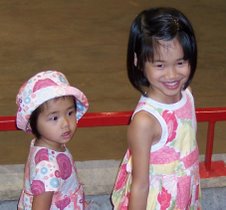I’ve finished grading my first set of student papers – the essays I assigned in my Women in American Law class. I asked the students to analyze Chinese retirement law that requires women to retire 5-10 years before men in light of the various strands of feminist legal theory we had studied. I was generally pleased with the quality of the work, though most of the papers didn’t really deal explicitly with the theories we’d learned (which is actually pretty common in student papers in the U.S., too!). And the papers were really quite impressive considering that English is the students' second language. I really enjoyed reading the essays, and I learned a LOT about Chinese retirement law and attitudes toward women.
First of all, it seems there is a different retirement age depending on whether one is a “cadre” or a “common worker.” If a cadre – “leaders and intellectuals” who do “brain work” – the retirement age for men is 60 and for women 55. If a common worker – laborers or “blue collar workers” – then men retire at age 60 and women at age 50.
Why? I’m told that the legislators who passed the law did so because they “considered that women were weaker than men constitutionally, and they had the heavy burden of taking care of the family [including ‘the olds’].” Thus, the regulation “incarnated the care for women from legislation.” Or, the law is a compensation for women because “women have been making a great contribution in realizing human reproduction for a long time, such as the pain of pregnancy, the pain and danger of childbirth and so on.” And, I’m told, many believe that, although women live longer than men, “the strength and intellectuality of women become senile earlier than that of men.”
The students generally agreed that the law was appropriate when it was passed, because “in the early ages of country establishing, our country was very poor. . . . Very few women had the opportunity to get education, and they had too many children to take care of. Synchronously, jobs for women almost only asked for physical force.” But, the students noted, since the “reform and open policy” was inaugurated, the country has become stronger and more productive, and “the whole society has changed into a period of brainwork.” [OK, we'll ignore all the peasants on farms in rural China . . . .]
And some thought it was still appropriate today, at least for those in industrial jobs. “Putting off the age of retirement for women means that many laid-off women workers must pay more social security insurance and acquire pension later. This is fatal to them. And for most women who work in the nationalized businesses, retiring a little earlier is a relief. Because their salary can’t be paid on time, the welfare is poor and the intensity of labour is large. So women working in the nationalized businesses hope to retire earlier.” As one student put it, these women workers might say, “I am a worker, my company is not a good company, I earn little money per month, if I continue to work in that company, I have no time to look after my grandson or granddaughter, so I prefer to retire early.” Or, “I have done the same work for twenty years, but I haven’t made any progress in this area, so I want to do some business, like selling books or opening a dining-room. Early retirement is a benefit for me.”
And for these physical laborers, I’m told, “we must face up the fact that men and women are different in physic. Lung vital capacity, cranial capacity of women is not as large as that of men. . . . This difference is natural. It is not related with sex discrimination. . . . So women workers should retire earlier than men workers.” It’s different, though, for “women cadres and women intellectuals.” “These women acquire more education and stronger self-awareness. And they don’t face the problem of physical power. In general, for these women, their economic motivations of getting a job are weaker and the social motivation of self-realization are stronger. Many women intellectuals have not already considered jobs as means of making a living. They want to fully use their individual abilities and realize their individual value and social value.” [No more class struggle in China, hmm?!]
But most thought that the lower retirement age for all women was unfair and unnecessary. Women are disadvantaged because they are forced to retire at a time when they are at the peak of their careers, when they no longer have child care responsibilities. They note that women over 40 find it difficult to get new jobs, or to get promotions, because they are seen as so close to retirement age. And since women are forced to retire early, they find it difficult to get the full number of working years necessary to get a full retirement allowance. All of these things affect women inside the family as well as outside the family – “the economic standards of man and wife determine who is the leader in the family. So women can acquire equal rights and power only by acquiring same resources as men out of families, such as earning, reputation, status and so on.”
And, they say, the justifications given for the lower retirement age – family responsibilities – no longer applies: “First, as the enforcement of the policy of ‘one family, one child,’ most of Chinese families only have a child. It has relieved women of heavy burden. Second, there is not so much housework as before, for the family have financial ability to make third-party do it. Third, more and more young couples live apart from their parents so that they can enjoy freedom and live an individual life [and thus no longer have to take care of elders].”
And most seemed to think that the real reason there is no movement to change the retirement age for women is that there are not enough jobs to go around, so workers have to be forcibly retired to make way for younger workers: "our country has a large population, which is becoming into a society of olds. The situation of employment is very austere, which is the biggest problem in our country." Why do women workers have to retire to make way for younger workers? “Because of the stereotype of women as inferiors, women must immolate their profits to keep the running of the whole society.” Or as another student puts it, the policy “looks at women as the fragile and incompetent people, keeps the dominance of men, and makes women the victims of the current system. I can not help asking some questions. For example, don’t old men increase the financial and employment pressure?”
One student wrote, “As women in other countries, Chinese women have a lower position than men in our society. There is still much discrimination on the basis of sex, though the principle of Equality between Men and Women is written into our constitution. Many boys of my friends think that there are no discriminations against women and even Chinese women have more rights than men. . . . How could they be aware of the unfair treatment against women?”
Another ended her paper by saying, “In a word, I don’t agree with the compulsory regulation that women should retire 5 years earlier than men. It harms women and harms the society. I don’t know who benefits from it, maybe the men!”
Phew! The student papers argued quite passionately – it looks like I’ve got quite a group of budding women’s activists! It will be really interesting to see what this group of cadres and intellectuals accomplish before they are forced to retire!
Subscribe to:
Post Comments (Atom)







2 comments:
This is so interesting! Thank you for sharing, it is so much fun to read your blog each day.
Even though the laws are different is various countries, it seems that the thinking is much the same...most men think that women are the weakest sex! It is not funny.
Post a Comment